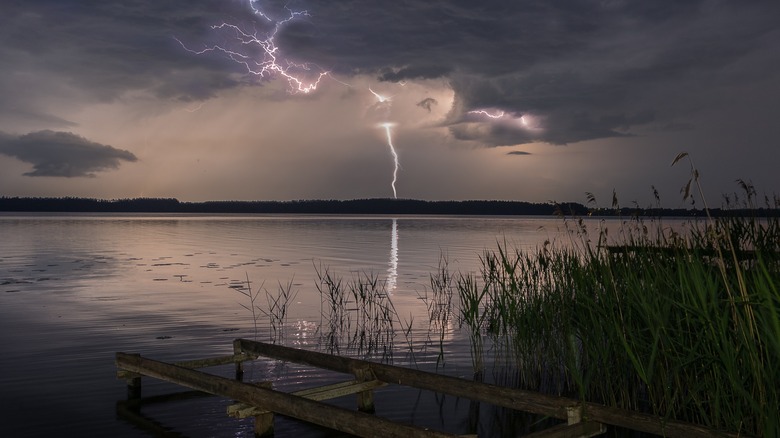Nostradamus' Predictions For 2026 Are Pretty Spooky
It's never too late to follow your dreams: Case in point: Nostradamus didn't start publishing enigmatic predictions of future disasters until he was in his late 40s. (Nothing brings home the terror of the future like the aches and pains of midlife.) A Frenchman who had trained and practiced as a physician, Nostradamus — government name Michel de Nostradame — began publishing creepy rhyming verses allegedly predicting the future in 1550. Despite what could be charitably called a mixed record of accuracy, his predictions came to the attention of the queen dowager of France, the intimidating Catherine de Medici, and her patronage ensured that Nostradamus and his musings would be remembered for centuries.
It's always a safe bet to predict that somewhere, somehow, disaster will strike, but even this "stopped clocks are right twice a day" logic hasn't kept people from poring over Nostradamus's often vague prophecies. They're generally not connected to specific years, instead being grouped into collections of 100 stanzas called "centuries." To peep what fate has in store in 2026, we can look at the 26th stanza in each collection, then have a little fun with numerology to see what else may be in store.
'The great man will be struck down in the day by a thunderbolt'
Century I's 26th stanza tells us that "the great man will be struck down in the day by a thunderbolt." It sounds like an assassination, and of course "great man" could refer to almost any prominent enough male public figure. As scary as the idea of being struck by lightning is, most victims survive, with the CDC reporting that over 90% of people struck by lightning live to tell the story at the slightest suggestion for the rest of their lives. Between 2006 and 2021, 444 people died from lightning strikes in the United States, and — significantly for any great men out there — men were several times more likely to be struck than women. (We can all imagine why.)
If we expand the lightning strike to include something a bit more metaphorical, we could consider the dangers of directed energy weapons. This emerging suite of technologies uses energy instead of projectiles to cause harm. Militaries like those of the United States and China are exploring offensive lasers, particle beams, and microwave blasts, none of which take a huge stretch to think of as a form of manmade lightning.
'Pestilence in Tuscany'
Century I, verse 26 ends with an almost offhand reference to "pestilence in Tuscany." The Tuscans might be especially dismayed to hear this, as Italy was the first country outside Asia, where COVID-19 was first detected, to see major spread of the virus and the subsequent death and disruption. Surely their luck won't be that bad again?
But what if we're not talking about an outbreak in Tuscany itself but an outbreak otherwise related to Tuscany? Toscana virus, named after the Italian word for "Tuscany," is a seasonal virus endemic to several countries along or near the Mediterranean and spread by biting insects called sand flies. It's a relatively common infection in the areas in which it occurs, and while it's usually not dangerous, it occasionally can cause lethal meningitis. Notably, researchers have noted that the range in which the virus occurs seems to be spreading, possibly because the insect species that carry it are expanding their ranges in response to climate change. "Occasional" meningitis might suddenly not be all that rare.
A final worrying point: Epidemiologists have noted a phenomenon called "airport malaria," in which infected mosquitoes hitch a ride on an airplane and emerge to infect people living near the destination airport. While person-to-person spread has not been observed with Toscana virus, an enterprising little fly might hop a flight, see the world, and infect exciting new people. Scary!
'Ticino will overflow with blood'
Century II, verse 26 offers a wartime warning: After backing a loser in battle, "the Ticino will overflow / With blood, fires, deaths, drowned by the long-edged blow." Ticino is one of the prettiest parts of Switzerland, an Italian-speaking canton full of forests, vineyards, and lovely mountain lakes. Like the rest of Switzerland, the canton has remained neutral and avoided external conflict since the end of the Napoleonic Wars, remaining loyal to the Swiss Confederation even as Italy unified.
Ticino remained shielded by the famous Swiss neutrality even during World War II. Impressive, considering it had a front-row seat to the collapse of Fascist Italy and the subsequent German invasion of Italy's north, as well as a somewhat porous border that allowed partisans to hide in Ticino before returning to Italian territory to continue anti-German resistance. Today, the city of Lugano in Ticino has the lowest crime rate among major Swiss cities. It's hard to imagine what would cause this idyllic and tranquil region to collapse into bloody chaos, but residents might want to stock up on batteries and bottled water just to be sure.
'The great swarm of bees will arise'
Century IV, stanza 26 offers an entomological caution: "The great swarm of bees will arise, / Such that one will not know whence they have come." Optimists and the conservation-minded people might be pleased to read here encouraging signs about a rebounding of bee populations, especially given that commercial honeybee populations in the U.S. saw unusually steep declines in 2025. More bees is good news, right?
More bees might be welcome, but more bee-like insects might not be. Cast your mind back to the dark days of 2020, if you haven't blocked it all out, and remember the scare of advancing Japanese giant hornets. The large, aggressive hornets, described by a jittery media as "murder hornets," have an appetite for bee flesh, savaging colonies of their smaller cousins at any opportunity. Multiple stings can prove fatal to human victims. Specimens were found in the Western U.S. and Canada, and only after an initial eradication effort and years of monitoring were the hornets declared extirpated from North America. While the initial invasion was stopped, there's no guarantee that these potentially invasive hornets won't pop back up like a segmented Jason Voorhees to wreak gory havoc on American ecosystems.
'They will prepare idols of Kings and Princes'
Famously, the Judeo-Christian-Islamic God doesn't like idols. It's easy to see why: If you were the author of all creation, wouldn't it annoy you to see people diverting their worship to something they themselves had made? In Century III, verse 26, Nostradamus warns us: "They will prepare idols of Kings and Princes." While there's not a clear indication of who these idol-makers will be, developments in American politics provide some hints.
There have been at least two notable instances of gold statues of Donald Trump. In 2021, at the annual Conservative Political Action Conference, a gold statue of the then-ex-president was displayed. Made from fiberglass in Mexico, it perhaps lacked the gravitas of its biblical predecessor, the Golden Calf of the Israelites, but that didn't stop commentators from pointing out that the Biblical Hebrews came to regret their idolatry. In 2025, another shiny yellow Trump popped up, this time holding a physical token of the famously not-physical Bitcoin. The 12-foot-tall rendition was placed on the National Mall by a group pleased by the 47th president's apparent fondness for the cryptocurrency. Though it was only erected for a few hours, people were quick to compare it to the ill-fated Biblical King Nebuchadnezzar and his own colossal golden vanity project.
A one-dollar coin celebrating the U.S.'s 250th birthday, featuring Trump on both sides, has been proposed for a 2026 minting. We'll have to wait to see if it's gold.
'The slavish people through luck in war / Will become elevated to a very high degree'
Century V, verse 26 predicts glory in war for ... someone: "The slavish people through luck in war / Will become elevated to a very high degree." Who is or is not "slavish" may be a matter of perspective (or prejudice) in a world that has at least nominally outlawed slavery in most countries, but let's look at the etymology of the word "slave." In English, as in Romance languages, the word for "slave" is linked to the word "Slav" because, before the opening of Africa to the vile practice, Slavic groups were the preferred victims of traders.
The obvious conflict involving Slavs is the ongoing Russo-Ukrainian war. Both Russia and Ukraine are ethnically Slavic, as are secondary participants like Ukrainian supplier Poland and Russian ally Belarus. Early 2026 will see the grinding conflict that began after Russia invaded Ukraine complete its fourth year, with neither Moscow nor Kyiv seemingly ready to throw in the towel. Maybe a battlefield breakthrough or diplomatic coup is in the cards?
Another Slavic flashpoint to watch: Serbia and its neighbors. The ashes of the former Yugoslavia still smolder, with tensions high between Serbia and Kosovo, and Serbs in Bosnia and Herzegovina threatening to break from the country.
'Foists and galleys around seven ships, / a mortal war will be let loose'
More war talk in Century VII, stanza 26: "Foists and galleys around seven ships, / a mortal war will be let loose." A foist, for landlubbers, is an archaic type of sailing ship — a light, fast vessel suitable for shallow waters like those near coasts. A galley is a larger vessel driven by oarsmen. This line sounds like it's referring to a naval flashpoint, and the seas with the highest likelihood of seeing conflict are probably those around China.
The People's Republic of China wants people to take the term "South China Sea" very literally, laying claim to a large swathe of waters off its southern coast (see the nine-dash line controversy). Unfortunately for people who wanted a nice, quiet century, parts of those waters and the islets within them are claimed by Taiwan, the Philippines, Malaysia, Vietnam, and Brunei, with the situation further complicated by China's claim to all of Taiwan — and apparent consideration of taking the island by force. Just to make things worse, nearby Indonesia has separate naval disputes with neighborhood bully China.
To press its claims, China has built naval installations on reclaimed land within the South China Sea (called, of course, the East Sea in Vietnam and the West Philippine Sea in the Philippines). The nation has also barged into neighboring waters with massive fishing fleets, while all the participants have arrested fishermen from other countries operating in "their" waters. Add in the American interest in Taiwan remaining effectively independent, and the area looks like a big wet powder keg.
'The leader from Madrid will receive a wound from arrows'
Cuídate, Felipe: Century VII, verse 26 warns that "the leader from Madrid will receive a wound from arrows." Madrid, as the capital of Spain, has no shortage of leaders, ranging from the royal and political establishment of the Spanish state to the team captain of soccer powerhouse Real Madrid, Dani Carvajal. Happily for King Felipe, Queen Letizia, Prime Minister Pedro Sanchez, and any Madrilenos who simply happen to be bossy, the wound is not necessarily fatal. (As an interesting side note, Spaniard Andres Temiño Mediel recently took gold in the World Archery Championship, making him the country's first individual world champion.)
But what if the arrows are metaphorical? The royal couple of Spain and the current prime minister have all been beset by scandal in recent years. Queen Letizia has recently been accused of a torrid affair with her former brother-in-law; both she and Felipe drew fire for their close connections to a disgraced financier; and Felipe came to the crown after the 2014 abdication of his promiscuous, allegedly corrupt, elephant-hunting father, Juan Carlos. On the elected side of the Spanish establishment, Prime Minister Sanchez's family and government have both been implicated in corruption scandals. Could sniping by the press and public provide the "arrow" that fells one of these figures?
'The bones of Cato found in Barcelona'
A possible classical reference shows up in Century VIII, verse 26: "The bones of Cato found in Barcelona, / placed, discovered, the site found again and ruined." The most famous Catos are two Roman statesmen, one the great-grandson of the other. Cato the Elder is best remembered for constantly nagging the Roman Senate to finish the job and destroy Carthage (which it eventually did), and Cato the Younger was one of the allied politicians who tried to preserve the Roman Republic against Julius Caesar's accumulation of power. Neither of them died in Spain, so there's no real reason for their bones to be there, much less clearly labeled millennia hence, but strange things happen.
But! Cato Networks is an Israeli network and internet security company with, like most tech companies in 2025, an emerging focus on AI technology. If we read "bones" as a poetic reference to tech infrastructure, this offers an intriguing alternative understanding of the prophecy. Given widespread backlash against Israel in the wake of the Gaza war, could someone — say, a Barcelona-based hacker with an agenda — crack open Cato's shields and ruin some websites?
'The ancestors and forebears will come forth from the depths of hell'
If we play with numerology a little — and we're already playing with the prophecies of a long-dead mystic with an iffy track record, so let's go for it — we can add the digits of 2026 to get 10. Adding digits is a fairly common practice in numerology and opens up fun verses like this one from Century I, verse 10: "A coffin is put into the vault of iron, / where seven children of the king are held. / The ancestors and forebears will come forth from the depths of hell, / lamenting to see thus dead the fruit of their line."
Zombie kings? Ghost queens? Poltergeist archduchesses? Yes, please. After so many grim predictions of plague and war, an angry skeleton trying to keep a crown on its fleshless head might be the dark-humor visual gag a weary world needs. A good candidate for a crypt to watch for this postmortem royal uprising is the Capuchin crypt in Vienna, where many of the Habsburgs were laid. The Habsburgs are Europe's forgotten empire. They were at various points kings of Spain, Portugal, Hungary, and Bohemia; Holy Roman and Austrian emperors; and a passel of other titles. But after World War I, the family was reduced to being some rich people who had interesting grandparents. And as of 2023, the crypt is full — so perhaps it's time its residents walked the earth again?
'A great stench will come from Lausanne'
Using the "2 + 0 + 2 + 6 = 10" trick lets us play with a weird prediction from Century VIII, where verse 10: "A great stench will come from Lausanne, / but they will not know its origin, / they will put out all people from distant places." Lausanne is an old and hilly city in French-speaking Switzerland with a long literary history. It currently serves as the headquarters of the International Olympic Committee and is not particularly known for its odor.
But look: A lot of things smell bad, and most cities are but one sewer catastrophe away from olfactory disaster. More ominous is the idea of "[putting] out all people from distant places." Lausanne has a large and diverse immigrant population, with immigrants and their Swiss-born children making up over half of the city's population and over 160 countries of birth represented among people living there. But with attitudes hardening against migrants around the world and particularly in Europe, it's unfortunately easy to imagine some event catalyzing hostility to new residents, as has occurred in a number of countries in recent years. Switzerland hasn't made the headlines the U.K. and Ireland have for their hostility to new arrivals, but it's not immune to anti-migrant violence: A 2021 Amnesty International report cited beatings, restraints, and sufficient exposure to cold to cause hypothermia among the abuses suffered by asylum seekers in Swiss custody in 2020 and 2021.
'Stained with murder and enormous adulteries, / Great enemy of the entire human race'
Looking at Century X, verse 10, we get a chilling description of a wicked figure: "Stained with murder and enormous adulteries, / Great enemy of the entire human race: / One who will be worse than his grandfathers, uncles or fathers, / In steel, fire, waters, bloody and inhuman." The world being what it is, plenty of leaders are stained with murder and adultery (though their "enormity" is probably in the eye of the beholder). But given the reference to "grandfathers, uncles or fathers," it's worth noting that some modern dictators are nepo-babies, and some have their heirs all picked out.
The most famous hereditary dictatorship is probably the Kims of North Korea, where Kim Jong-Un, grandson of the state's founder, does charming things like shoot people with anti-aircraft guns. He only has a young daughter, but North Korea thinks she may be being groomed to succeed him. Equatorial Guinea, recently in the news for a plan to have the U.S. ship migrants to the small, Spanish-speaking African state, has been in the grip of Teodoro Obiang Nguema Mbasogo since he overthrew his equally tyrannical uncle in 1979. Obiang appears to have tapped one of his sons to succeed him, though at 83 he's still clinging to power. And hey, let's not discount the Assads of Syria. Bashar, ophthalmologist and murderer, succeeded his father as strongman in 2000 and ruled until his 2024 overthrow and flight to Moscow — but he's got sons and brothers who may have eyes on a return to Damascus. Will one of these dastardly dynasties rock the world in '26?












